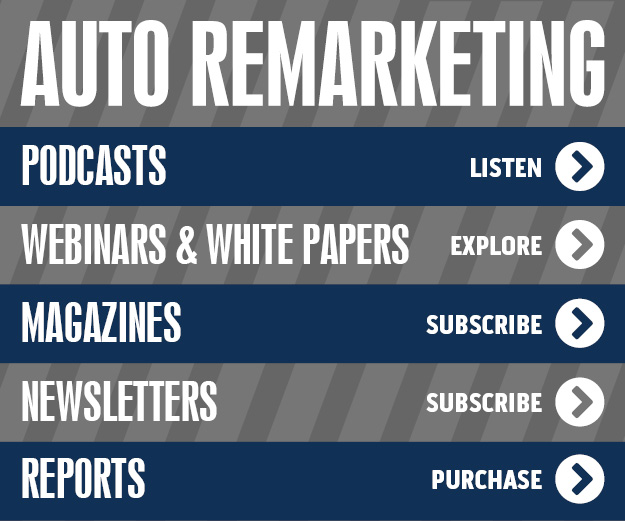Webb: Negative Economic Trends Continue to Haunt
ATLANTA — Manheim's Tom Webb didn't sugarcoat his opinion of broad economic indicators — especially about consumer confidence and the job market — when he compiled his August Auto Industry Brief.
Simply put, Webb described July by stating "it wasn't a month for good news."
Manheim's chief economist began to defend that stance by explaining, "consumer confidence slipped and so too did that of small businesses. That's troubling since, in terms of the recovery, they represent two legs of what is basically a two-legged stool."
Webb insisted that inflation and interest rates remained non-issues, but he thinks that stems from a reflection of weakness in the economy.
"It certainly wasn't a testament to the country's fiscal management," he declared.
"Although this would appear to be an opportune time to jump on the double-dip bandwagon, we prefer our slightly contrarian, but often just as bearish, outlook," Webb went on to indicate. "Specifically, we think the economy will avoid a major retreat in the near term, but that the recovery will face additional, and more severe, tests before the economy gets back to its previous peak."
Manheim then delved into recent data to support its overall analysis.
Webb determined the first-quarter rebound in consumer spending appears to have "left households exhausted — exhausted of funds that is." He shared how consumer spending, excluding automotive retail sales, inched ahead 0.2 percent in July over the previous month. However, after consecutive months of downward momentum, July's level was 1.2 percent below the reading in April, according to Webb.
Webb believes three basic forces cause consumers to slow spending: lack of income, a lack of confidence, or a need to repair balance sheets.
"Today, all three forces are in play," Webb asserted.
"Earlier reports on production and imports suggest that the continued weakness in retail sales has led to a build-up of inventory," he continued. "Thus, we will probably see better sales during the important back-to-school season, but it might be based solely on increased discounting."
For households that do have a steady income, Webb determined the areas where consumers are sending money: debt servicing and savings.
According to Webb's calculations, consumer installment debt outstanding declined for the 16th out of the past 17 months in June. Consumers are now spending 12.5 percent of their income servicing debt, down from a peak of 14 percent in the first quarter of 2008.
"This is a result of households willingly paying down debt, as well as credit card companies requiring larger monthly payments, reducing lines of credit, and writing off bad debt," Webb highlighted.
In terms of savings rates, Webb indicated it rose to 6.4 percent in June, up from 5.9 percent during the same month last year. Between 2005 and 2007, he said the savings rate was about 2 percent.
"The consumer's new-found frugality is good for the long-term, but it is hurting the retail sector today," Webb pointed out.
What's likely not helping retail sales or consumer confidence is ongoing unsteady conditions in the labor market. Webb mentioned that there were only 71,000 more jobs created in the private sector in July, which didn't do much at all to balance out the loss of 143,000 temporary U.S. Census workers.
Furthermore, he noticed the loss of other government jobs — mostly state and local — left total non-farm payrolls declining by 131,000 in July.
"Thus, despite gains in the first five months of the year, total employment is now 7.7 million lower than at the peak reached in December of 2007," Webb noted
Webb emphasized that no job growth equals no income growth.
"Personal income — and to an even greater extent, the narrower measure that looks at only wages and salaries — took an unprecedented hit during the Great Recession," Webb stressed.
"At the trough, the year-over-year decline was 2.4 percent for personal income and 4.6 percent for wages and salaries," he explained. "Both measures are now slightly positive on a year-over-year basis, but that is partly because of easy comps."
Unfortunately, the stream of less-than-positive analysis didn't stop there.
Webb also mentioned that the Conference Board's measure of consumer confidence eroded even more last month, following the steep dip in June.
"Given the poor job market, rising foreclosures, and the noticeable stall in the recovery, consumer angst is justified," he cautioned.
Displaying a similar pattern, Webb shared that the National Federation of Independent Business Index of Small Business Optimism slowed last month, after it declined heavily in June.
"In this instance, growing uncertainty created by the growing role of government in the economy was a factor," Webb explained. "Although surveys of consumers and businesses can be unreliable, one thing is certain — the prophecies can become self-fulfilling.
"In June, we noted a Gallup survey which suggested that high-income households were the only ones left spending," he went on to say. "More recent surveys show that even the rich are now pulling back — and especially on big-ticket items.
"Blame it on a lackluster and volatile equity market, the absence of any options to earn safe interest income and pending tax increases," Webb insisted.
The August Auto Industry Brief wrapped up with Webb answering a couple of questions he received since Manheim released the last report.
First, Webb was asked if any aspects or other indicators lead him to believe that the labor market could show improvement, despite July's employment report being a big disappointment.
Webb began his response by conceding, "unfortunately, very few."
He continued with "in fact, a rise in the number of long-term unemployed and a decline in labor force participation rates suggest the weakness is becoming entrenched. Likewise, the 'quit rate' is holding steady."
Webb insisted that, "in an improving labor market, the quit rate should rise as workers become more confident of finding other work. And finally, it was bad enough that initial jobless claims hadn't moved down in 2010, but then, in recent weeks, they actually moved up."
Webb finished answering that line of questioning with an uplifting thought.
"One positive is that business investment in equipment and software jumped 22 percent in the second quarter," he shared. "Increases in business investment have historically preceded increases in hiring by three to four months."
"To be sure, there is a lot about this recovery that is atypical, but this one sign gives us hope that there will be some significantly positive employment gains before year end," Webb added.
The other question Webb tackled had to do with how long-term interest rates fell sharply after the Federal Reserve announced it would re-deploy the runoff in their mortgage-backed securities portfolio into long-term Treasuries. The inquirer thought this situation was good, but was left confused when the New York Stock Exchange fell and analysts became more pessimistic.
"It's a case of Fed watchers reading between the lines," Webb began. "These analysts fear that the Fed knows more than they do and that the Fed is very concerned about the recovery's viability. The policy itself should have little effect. After all, a decision not to re-deploy the monies would have a represented a de-facto tightening."
Webb's response continued by asking his own question. He wondered, "will lower long-term rates help the economy?"
The response was doubtful.
"The housing market has remained in the doldrums even with mortgage rates at multi-generational lows for some time," Webb asserted. "Large corporations have, and will, take advantage of cheap money with massive bond offerings, but small business will still have limited access to capital.
"The narrowing in the spread between the 10-year and 2-year Treasury notes should be welcomed, but the yield curve is still steep," he concluded.

 View The Latest Edition
View The Latest Edition

